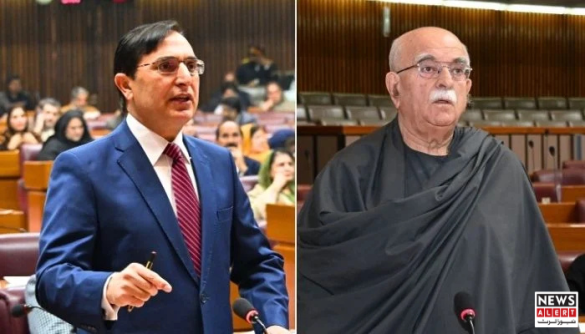Two senior judges of Pakistan’s Supreme Court — Justice Mansoor Ali Shah and Justice Athar Minallah — have resigned, marking a decisive moment for the country’s judicial landscape. Their sudden departures come just as the government accelerates plans to establish a new Constitutional Court under the proposed 27th Constitutional Amendment.
Resignations Spark Fresh Debate
On Wednesday, both judges confirmed their resignations. The news broke shortly after reports surfaced that the government was moving swiftly to form a Constitutional Court responsible for handling constitutional issues currently dealt with by the Supreme Court.
As a result, their departures have intensified an already heated national debate on judicial reforms. Many legal experts now view these developments as part of a significant shift in Pakistan’s judicial structure.
Justice Aminuddin Khan Expected to Lead the New Court
According to multiple sources, Justice Aminuddin Khan has emerged as the top candidate to head the new Constitutional Court. His oath‑taking could even occur as early as tomorrow.
In anticipation of his expected elevation, Chief Justice of Pakistan Yahya Afridi has organised a dinner in Justice Aminuddin’s honour. The gathering, scheduled at the Chief Justice’s House and attended by all sitting Supreme Court judges, signals a formal acknowledgment of his likely new role.
A Change in Retirement Plans
Justice Aminuddin was originally set to retire on 30 November. However, the possibility of him leading the new court has suddenly changed the context around his retirement. His expected appointment comes during a period of institutional transition, giving his role far greater significance than previously anticipated.
Observers note that selecting a judge close to retirement reflects both the urgency behind the government’s reform plans and the rapid pace of the amendment process.
Understanding the 27th Constitutional Amendment
The proposed 27th Amendment aims to establish a specialised Constitutional Court. Supporters argue that this move will ease the Supreme Court’s overwhelming caseload and allow clearer separation of responsibilities. Under this model, the Constitutional Court would handle constitutional interpretation while the Supreme Court would focus on appeals and broader legal matters.
However, critics remain wary. They fear that the new court may weaken the authority of the Supreme Court and shift institutional power toward the executive. Additionally, they warn that structural changes must not undermine judicial independence.
Pakistan’s Supreme Court currently faces more than 56,000 pending cases. Supporters believe that a separate constitutional bench will reduce this backlog. Nevertheless, opponents caution that efficiency should not come at the cost of institutional balance.
A Sensitive Moment for the Judiciary
The resignations of Justice Shah and Justice Minallah add more pressure to an already delicate situation. Both judges have consistently spoken about the need for transparency and institutional reform. Therefore, their sudden exits naturally raise several questions:
- Did they resign in protest?
- Will the new court limit the Supreme Court’s authority?
- Can the judiciary maintain public trust during this transition?
These concerns highlight the deep divisions within legal and political circles.
A System at a Crossroads
Pakistan’s judiciary has faced repeated stress over the years — from political controversies to constitutional crises. Now, the latest resignations and the proposed reforms create yet another defining chapter.
As Parliament, the executive, and the judiciary move forward with the 27th Amendment, the future of constitutional interpretation in Pakistan may change dramatically. The coming days will therefore play a crucial role in determining whether the country enters a new era of judicial efficiency or encounters new institutional challenges.
For now, the nation watches closely as Pakistan’s judicial landscape stands at a turning point.















